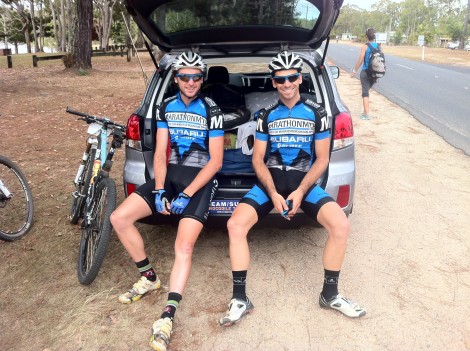It’s 2018 and I have realised it is now more than 10 years since my first mountain bike stage race – BIKE Transalp in 2008, where I raced with Scott Cornish. Interestingly enough Scott was also racing at the Snow Bike Festival in January earlier this year, an altogether different race to the 8 days from Austria to Italy 10 years previously.
Over the past 10 years I have started at least 22 stage races of 5-10 days length (unfortunately I haven’t finished a few of those) and at least another dozen 3-4 day stage races as well. That range of racing and travel has been chock full of life experience, new friendships and learning more about different parts of the world. But it’s also equipped me with a very niche skill set for approaching stage races.
Here’s a look at some of the key things that 10 years of chasing events has taught me about mountain bike stage races.
Hardship is best in company
I prefer a paired stage race. Even if you’re super fit, you will suffer in a stage race. And especially when the days or overall length gets hard, it is always better with someone else. I find it’s too easy to fall inline with negative thoughts and processes when battling on your own, and if you’re not careful a DNF or result that you’re not happy with can follow.
Company makes hard times better.
But racing in a pair is a much better experience. The personal ebb and flow of stage racing is different for each rider and hopefully your low points will be matched with your partner’s high points – or shared goals will get you through. Finding the right team mate is a key part of this.
Take the right bike
This one sounds obvious, and it is too much to think that we all have a quiver of bikes to select from for a given event. But, you can change a few parts to suit the demands of your event. Choosing the right bike for stage racing isn’t a simple step. You should already know whether you prefer a hardtail or full-suspension bike.
I took a hardtail to Mongolia – but if I went again I’d take a short travel full-suspension bike for better pedalling over choppy terrain. Photo © Erik Thompson
Fine tuning your bike makes a difference. It pays to ask around, and even look to advice from the event website. There may be suggestions on gearing, or even tyres. It is easy to turn up to an event over or under geared, especially on a 1x system. Some riders will even change chainrings between stages to get their gearing just right. This could include changing to lighter wheels, or stronger tyres, or running more sealant – it might even be based on fitting or removing a dropper seat post.
Bottle or bag? Plan your hydration
If you have ever been stuck on the trail really rationing your fluids – you know how much it sucks. Just like for planning what bike to take, or specifically how to setup your bike, planning for hydration is important. Studying the route and where feedzones will be is essential. Can you send bottles there? Is there food? Is it race food or trail snacks?
Can a bottle do everything?
With a few modern bags like the Camelbak Chase Vest and XCT Dart there are good options for taking 1.5L of fluid in a lightweight option on your back. Given most full-suspension bikes only fit one 800mL bottle, or maybe two 600mL bottles, a hydration system can be an excellent option for some races – or just select stages. For me, the key thing is being open to pulling on a bag if it means proper hydration. It’s hard to come back from dehydration in a stage race.
Sometimes a small backpack is the smarter choice.
Google Maps is your friend
When planning your travel to and from a stage race – understanding where you are in the world is really useful. Finding the race start and finish via Google Maps should be easy, and it should let you figure out your transport options to and from the start and finish.
There can still be some traps though, as some countries have a few towns with the same name, so be specific, check details on the event website and even double check locations.
Check that the accommodation you’re booking is in the right place – and has everything you need.
If you’re travelling to the event without a car, use maps to see how close your accommodation might be. Distances given via accommodation booking sites are often direct – so it pays to see how close it might be, and whether a serious mountain pass is involved. Having something like booking.com or AirBNB open at the same time is one of the best ways to cross check your options. I was caught out in 2009 in Poland, with the race starting on the other side of a mountain pass that I needed to get myself, my bike, my bike bag and backpack over. Thankfully a chance encounter at the airport the previous day meant I had a friend to phone for a lift. I’ve booked more wisely since then!
Routine is king
Within the MarathonMTB.com Team, and amongst some of our best contributors, we have a saying. “The race isn’t over until you’re in the shower.”
Once you’re finally done and showered – the race is over. But if you’re on our team then it’s writing time.
What does that mean? Well it means don’t truly stop until you’ve had some food, got your kit off (and in the wash) and cleaned and prepped your bike. If you’re racing in a pair, you can swap tasks with your team mate for cleaning bikes, or bottles and kit. But get that all done, get clean, then put your feet up. You’re done.
Post-stage clean-up. Photo: Paolo Martelli
And part of that routine should be your bike prep. Know what you need to check from tyre and shock pressure to bolts, from charging GPS units through to lubing your chain. Having a routine will ensure you do it all efficiently, and get onto recovery for the next stage as fast as possible. Or you go and get a glass of wine or a beer – your call.
The recovery starts at the winery
Don’t pack the kitchen sink
There is a fine line between taking too many things, and not enough. At some remote stage races the only way you’ll get spare parts is if you’ve brought them yourself or if you can come to an agreement with a better equipped racer. At other races, like Transalp, the support from Shimano and Scott bikes is so immense that anyone riding one of those brands virtually rides like a factory team rider.
Away from bike spares, you also need to think about your comfort on and off the bike. The right clothes, the right recovery equipment, nutrition, a book, charging cords. It really starts to stack up. I suggest laying it all out, and see how much fun it is unpacking and repacking it each day, especially if you’re in a point to point race. How much will you enjoy that at 6am?
Packing into and out of a tent is a good way to realise you might have brought too much. Photo: Gary Perkin/Cape Epic/SPORTZPICS
Cover the basics of what you need, with some key comfort items and leave it at that. Make sure you have some nice clean clothes and shoes with your bike bag for the end of the event, and run it pretty lean until then.
Don’t forget you’re on holiday
This is the big one. You’re using holiday days so make sure you’re having fun. If you do the right amount of planning, then everything should run well, and it will be low stress. If you analyse every possible detail that might take the shine off. There is so much you can’t plan for, and so many unexpected turns of events that are exactly what make mountain bike stage races such a challenge, and such a reward.
Don’t forget to take in all the good bits.
You need to be prepared to roll with what happens, and be ready to embrace the changes and opportunities. Have you found out there’s an after party, but you have an early flight to make? Well – I know what I would do. Got a couple of days to kill before the race and have you been invited on a pre-ride with riders you have just met? Sounds like fun! A mountain bike stage race is an adventure – don’t plan too much to stop it being one.
Yoga by the sea is just one of the perks of the BCBR.

